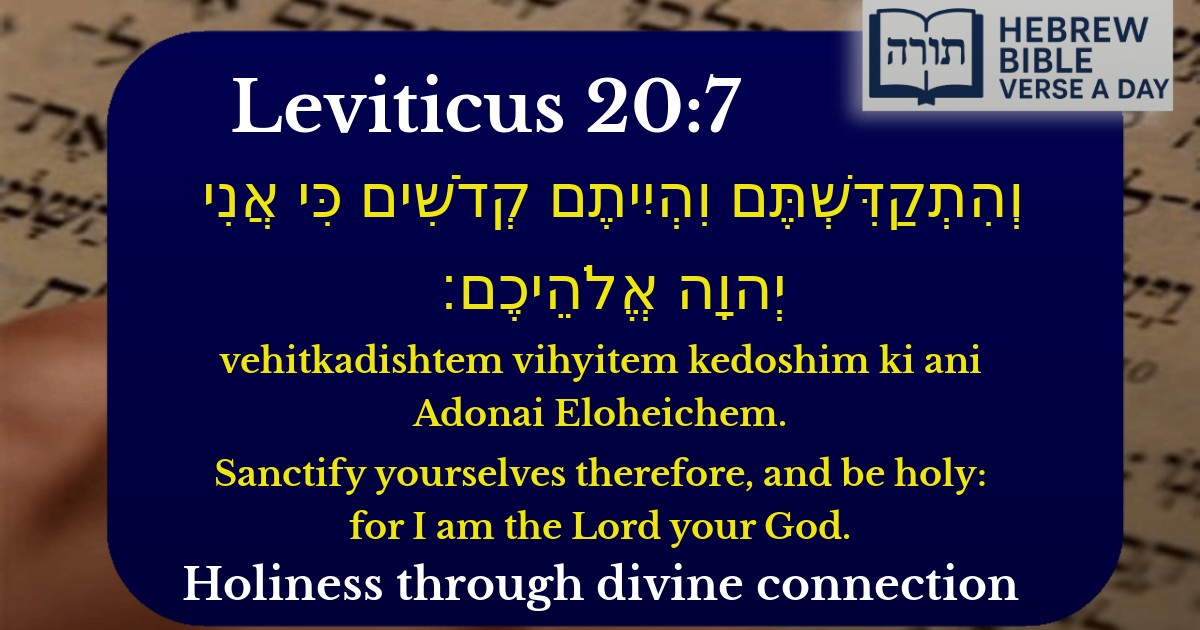Join Our Newsletter To Be Informed When New Videos Are Posted
Join the thousands of fellow Studends who rely on our videos to learn how to read the bible in Hebrew for free!
Hebrew Text
וְהִתְקַדִּשְׁתֶּם וִהְיִיתֶם קְדֹשִׁים כִּי אֲנִי יְהוָה אֱלֹהֵיכֶם׃
English Translation
Sanctify yourselves therefore, and be holy: for I am the Lord your God.
Transliteration
Vehitkadishtem vihyitem kedoshim ki ani Adonai Eloheichem.
Hebrew Leining Text
וְהִ֨תְקַדִּשְׁתֶּ֔ם וִהְיִיתֶ֖ם קְדֹשִׁ֑ים כִּ֛י אֲנִ֥י יְהֹוָ֖ה אֱלֹהֵיכֶֽם׃
וְהִ֨תְקַדִּשְׁתֶּ֔ם וִהְיִיתֶ֖ם קְדֹשִׁ֑ים כִּ֛י אֲנִ֥י יְהֹוָ֖ה אֱלֹהֵיכֶֽם׃
🎵 Listen to leining
Parasha Commentary
📚 Talmud Citations
This verse is quoted in the Talmud.
📖 Yoma 39a
The verse is referenced in the discussion about the sanctity of the priests and the importance of maintaining holiness in their service.
📖 Niddah 30b
The verse is cited in the context of discussing the sanctity and purity of the Jewish people, emphasizing the divine command to be holy.


Sanctification and Holiness in the Verse
The verse "וְהִתְקַדִּשְׁתֶּם וִהְיִיתֶם קְדֹשִׁים כִּי אֲנִי יְהוָה אֱלֹהֵיכֶם" ("Sanctify yourselves therefore, and be holy: for I am the Lord your God") appears in Vayikra (Leviticus) 20:7 and emphasizes the obligation of the Jewish people to strive for sanctification (kedushah) in their lives. Rashi explains that this sanctification is achieved through distancing oneself from sin and impurity, particularly in matters of forbidden relationships, which are discussed in the surrounding verses.
Rashi's Interpretation
Rashi (Vayikra 20:7) connects this verse to the previous context, which discusses forbidden relationships, and states that sanctification here refers to separating oneself from immorality. He further explains that wherever there is a barrier against sin, there is holiness. Thus, the call to "sanctify yourselves" is a directive to exercise self-control and adhere to the Torah's moral boundaries.
Rambam's Perspective
Rambam (Maimonides) in Hilchos De'os (Laws of Ethical Conduct) expands on this idea, teaching that holiness is not merely abstaining from sin but actively cultivating positive traits. He writes that one should sanctify themselves even in permitted matters by not indulging excessively, as holiness requires moderation and spiritual refinement.
The Midrashic View
The Sifra (a halachic Midrash on Vayikra) interprets the phrase "be holy" as a command to sanctify oneself through the performance of mitzvos. It teaches that just as Hashem is holy, so too must Bnei Yisrael emulate His ways by living a life of mitzvah observance and ethical conduct.
Practical Applications from the Talmud
The Foundation: "For I am Hashem Your God"
The concluding phrase "כִּי אֲנִי יְהוָה אֱלֹהֵיכֶם" ("for I am the Lord your God") serves as the basis for this commandment. The Kli Yakar explains that since Hashem is holy, His people must strive to emulate His sanctity. This reflects the principle of Imitatio Dei (emulating Divine attributes), as taught in Vayikra 19:2 ("You shall be holy, for I, Hashem your God, am holy").